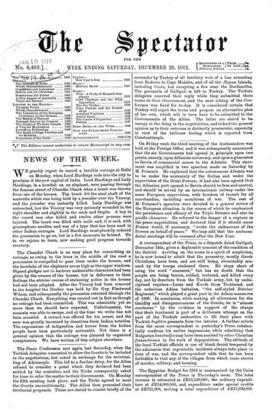A correspondent of the Times, in a dispatch dated Gallipoli,
December 14th, gives a deplorable account of the condition of the district. Arriving on the scene in a spirit of scepticism, he is now bound to admit that the peasantry, mostly Greek Christians, have been, and are still being, abominably mis- used by the troops stationed there. He stops short of using the word " massacre," but has no doubt that the people are being beaten, robbed, tortured, and killed every day, not by deserters from the Turkish army, but by undis- ciplined regulars—Lazes and Kurds from Trebizond, and the notorious Adana battalion, "the self-styled Butcher Regiment," which played a great part in the Adana massacres of 1909. In conclusion, while making all allowances for the timidity and disingenuousness of the Greeks, he is "almost overborne" by the evidence in support of the charge that their treatment is part of a deliberate attempt on the part of the Turkish authorities to fill their place with Turkish fugitive peasants from the interior. A further article from the same correspondent in yesterday's Times substan- tially confirms his earlier impressions, while admitting that Bulgarian komitadjis may have been assisted by other Christian francs-tireurs in the work of depopulation. The attitude of the local Turkish officials is one of blank denial tempered by the admission that regrettable incidents always take place in time of war, and the correspondent adds that he has been forbidden to visit any of the villages from which came stories of murder, robbery, and burning.


































